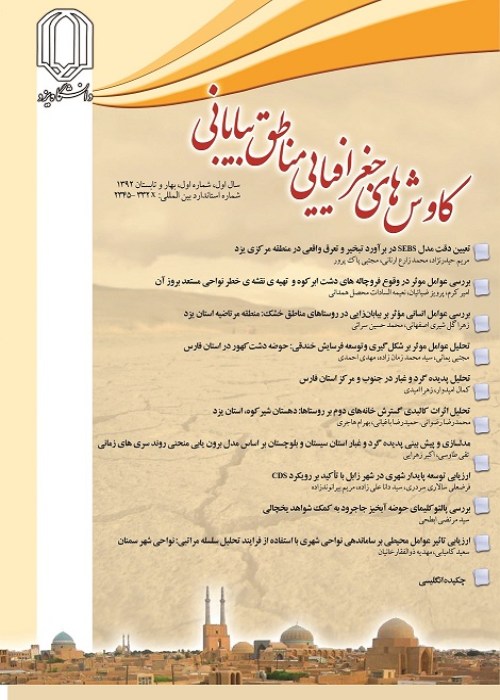The effect of the reconstruction and revitalization ofthe old urban areas of Yazd on tourism prosperity
The rapid growth of cities and urbanization and the increase of urban population in the country of Iran have created many difficulties and challenges in urban development management; so that the rupture in the structure of urban neighborhoods and the loss of their physical identity, have destructed the continuous social structure between residents and have reduced communication between people in neighborhoods and cities. Such disintegration of social relations and the lack of citizen participation in economic and social development plans in many cities of Iran, especially in metropolitan areas such as Yazd, have led to a loss of physical and spiritual capital and have aggravated urban problems and anomalies. Hence, these issues disrupted the efficiency of urban development management. In this regard, strengthen of social supports like social capital is one of the most appropriate strategies to advance urban development programs. In urban communities, social capital is one of the most important factors that strengthen and integrate public relations and networks, which in this way affects urban development and provides the basis for cultural, economical and social development of the city. Yazd city with its unique historical background, is one of the prominent examples of ancient cities in the country of Iran, which its urban development provides positive consequences for the development of the country. In this regard, the present study examines the role of social capital in urban development management in Yazd city.
The present study is applied, survey and descriptive - analytical research in terms of aim, method, and type of relationship, respectively. In this research, in addition to the library method, a questionnaire designed based on the research literature to obtain and collect the required information. The statistical population of this study includes all residents over 16 years old in Yazd city. The sample size is obtained from the Cochran's infinite population formula due to the infinity of the statistical population; then, the information of 384 people is collected using stratified random sampling method. To evaluate the validity and the accuracy of the questionnaire, the opinion of university professors is obtained who find the validity of the questionnaire acceptable. In addition, the reliability of the questionnaire is calculated using Cronbach's alpha measurement method. Cronbach's alpha coefficient is equal to 0.77, which indicates the acceptable reliability of the questionnaire. To investigate the social capital, five indicators, including social trust, social cohesion, social participation, social awareness and religiosity and religious beliefs, are used. Data analysis is performed in two descriptive and inferential sections. Pearson correlation coefficient is used to investigate the relationship between variables and finally, to identify the effect of independent variables on the dependent variable, the multivariate regression method is applied. We apply SPSS software to analyze data and consider p-value <0.05 as a significant level.
The results show that there is no significant correlation between gender and social capital, which is consistent with the results obtained by Javadzad Aghdam and Alavi (2016). Also, similar to Mohammadi (2013) results, no significant correlation is observed between education and social capital. The results of social capital and its indicators show that there are significant relationships between social capital of citizens in Yazd city and its indicators including: social trust, social cohesion, social participation, social awareness and religiosity and religious beliefs with urban development. These results are consistent with the findings of Kreuter et al. (1998), Moradi (2013), Krause et al. (2006), Cento Bull and Jones (2006) and Hofferth and Iceland (1998), respectively.
with attention to the findings results of present study, the urban development as a dependent variable is directly related to social capital as an independent variable, which means that according to Coleman (1988), Bourdieu (1990), Fukuyama (2001) and Putnam (2002), the high amount of social capital among residents make more feasible the goal of urban development. Therefore, it can be said that social capital can be a strong spiritual force for urban development. It should be noted that the impact of a society's social capital on the urban development process has clear consequences, provided that the content of social capital in the community is appropriate to the development goals and has the required flexibility. Achieving urban development is impossible without considering the institutional and human potentials and utilizing all individual and group capacities. In general and brife, the study states that in formulating development policies and programs in the city of Yazd, the role and impact of social capital should be considered and urban development can be achieved by strengthening social capital.
- حق عضویت دریافتی صرف حمایت از نشریات عضو و نگهداری، تکمیل و توسعه مگیران میشود.
- پرداخت حق اشتراک و دانلود مقالات اجازه بازنشر آن در سایر رسانههای چاپی و دیجیتال را به کاربر نمیدهد.


